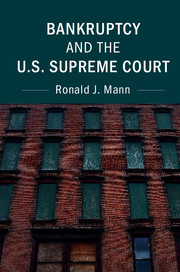Book contents
- Frontmatter
- Contents
- List of Figures
- List of Tables
- Preface
- Introduction
- PART I SETTING THE STAGE
- PART II THE HARD CASES
- SECTION A MISSED OPPORTUNITIES: CONGRESS, THE COURT, AND THE BANKRUPTCY CLAUSE
- 5 FromMarathon to Wellness: Assessing the “Public[ity]” of the Bankruptcy Power
- 6 Sovereign Immunity and the Bankruptcy Power: From Hoffman to Katz
- SECTION B INTERPRETIVE STRATEGY: THE COURT, THE SOLICITOR GENERAL, AND THE CODE
- PART III AMICI AND THE COURT
- PART IV CONCLUSION
6 - Sovereign Immunity and the Bankruptcy Power: From Hoffman to Katz
from SECTION A - MISSED OPPORTUNITIES: CONGRESS, THE COURT, AND THE BANKRUPTCY CLAUSE
Published online by Cambridge University Press: 04 May 2017
- Frontmatter
- Contents
- List of Figures
- List of Tables
- Preface
- Introduction
- PART I SETTING THE STAGE
- PART II THE HARD CASES
- SECTION A MISSED OPPORTUNITIES: CONGRESS, THE COURT, AND THE BANKRUPTCY CLAUSE
- 5 FromMarathon to Wellness: Assessing the “Public[ity]” of the Bankruptcy Power
- 6 Sovereign Immunity and the Bankruptcy Power: From Hoffman to Katz
- SECTION B INTERPRETIVE STRATEGY: THE COURT, THE SOLICITOR GENERAL, AND THE CODE
- PART III AMICI AND THE COURT
- PART IV CONCLUSION
Summary
INTRODUCTION
The murky boundary of Article III's limits on Congress's authority is not the only area in which the Court has considered the Bankruptcy Power. The Court also has repeatedly considered the interplay between bankruptcy adjudication and the intertwined topics of sovereign immunity and the Eleventh Amendment. The specific question is whether a bankruptcy court has the authority to order monetary relief against a State. It is here that Congress has spoken most clearly in favor of a broad exercise of the Bankruptcy Power. The end result, much as it was in the preceding chapter, was a congressional amendment intended to overturn the Court's narrow interpretation of the Bankruptcy Code, followed by a decision by the Court giving ground, finding room in the Constitution for Congress's vision of an effective bankruptcy process.
The story proceeds in three parts: a brief introduction to the Court's troubled and highly contested jurisprudence on the relation between the Eleventh Amendment and congressional power; the story of the Court's decisions in Hoffman and Nordic Village concluding that the Bankruptcy Code did not abrogate the sovereign immunity of the States or the Federal Government, respectively; and the final episode – the Court's acknowledgment in Katz that Congress not only had the power to abrogate sovereign immunity, but unquestionably had exercised it in the Bankruptcy Code.
SETTING THE STAGE: FROM FITZPATRICK TO UNION GAS
Like Marathon, Granfinanciera, and Stern, the Court's decisions in Hoffman and Nordic Village appear primarily as pawns in an extended conflict – in this case a heated debate that the Justices have carried on for decades about the proper relation between federal legislative power under Article I of the Constitution and the federal judicial power under Article III of the Constitution, as mediated by the Eleventh Amendment.
Because the Court's Eleventh Amendment jurisprudence has been so controversial (Young 1999, 7–12), a brief summary should be adequate. All would agree that Congress's proposal and the States’ prompt ratification of the Eleventh Amendment in 1795 reflected a direct rejection of the Court's 1793 decision in Chisholm v. Georgia1 affirming a money judgment entered directly against a State.
- Type
- Chapter
- Information
- Bankruptcy and the U.S. Supreme Court , pp. 79 - 97Publisher: Cambridge University PressPrint publication year: 2017



